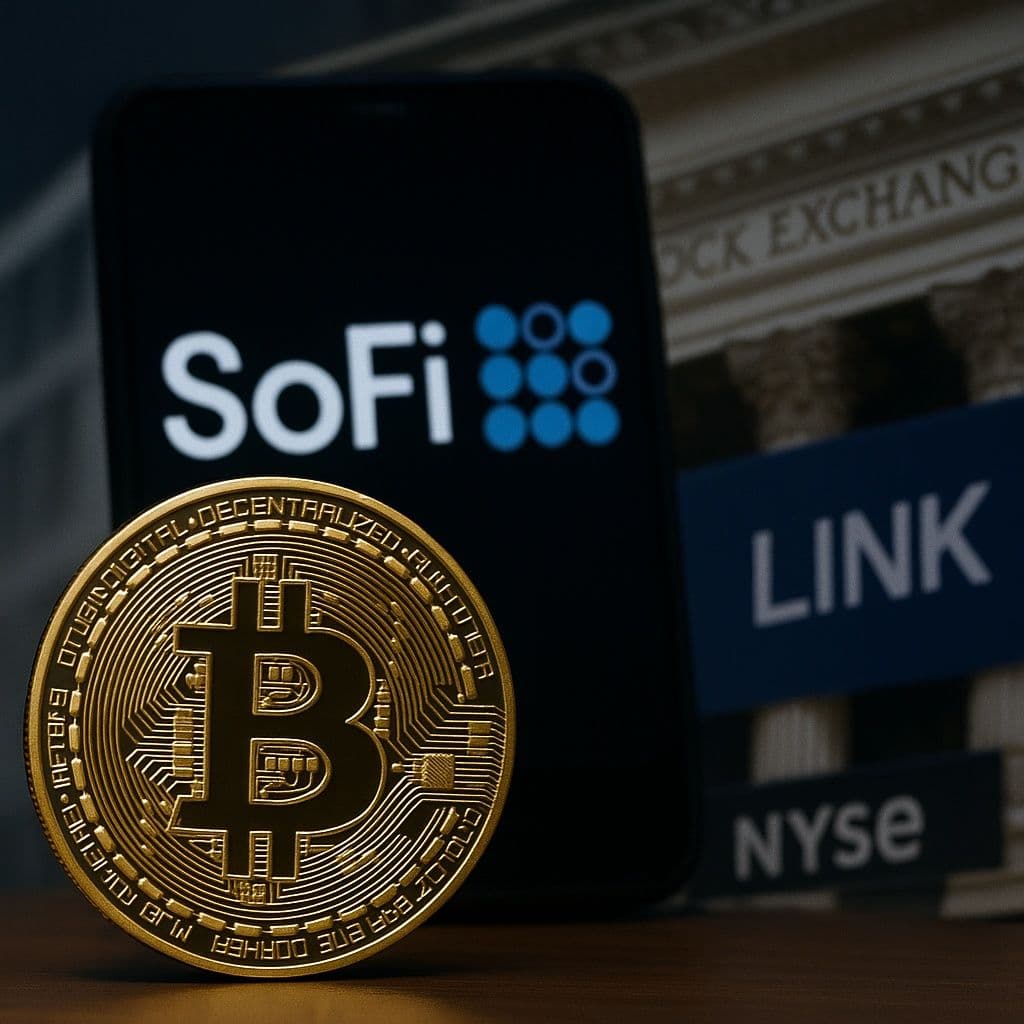Two significant developments are reshaping access to digital assets for retail and institutional investors. Fintech firm SoFi Technologies has officially launched cryptocurrency trading for its retail customers, while a proposed spot exchange-traded fund (ETF) for Chainlink (LINK) has advanced a key technical step toward a potential market debut. Both events signal the growing integration of crypto assets within the traditional financial system.
SoFi Enters the Retail Crypto Market
SoFi officially rolled out its crypto trading service on November 11, 2025, becoming the first nationally chartered bank in the United States to offer direct buying, selling, and holding of cryptocurrencies within its native application. The move represents a major milestone for the convergence of traditional banking and the digital asset economy. Members can now trade dozens of cryptocurrencies, including Bitcoin (BTC), Ethereum (ETH), and Solana (SOL), alongside their other banking and investment accounts.
SoFi CEO Anthony Noto described the launch as “a pivotal moment when banking meets crypto in one app, on a trusted platform.” He added that he believes “blockchain technology will fundamentally change every way finance is done.” The launch follows clearer signals from the Office of the Comptroller of the Currency (OCC) earlier in 2025, which indicated that banks holding a national charter could engage in certain crypto-related services, provided they have adequate risk management systems in place.
From a strategic standpoint, the new offering is designed to deepen customer relationships by cross-selling services across SoFi’s unified platform of banking, lending, and investing products. A recent analysis from Simply Wall St noted the move “could be a game-changer for SoFi’s innovation storyline,” although it cautioned that a material impact on revenue may take time to materialize. By embedding crypto trading directly into its app, SoFi aims to capture a larger share of its customers' financial activities and appeal to a digitally native demographic.
Spot Chainlink ETF Moves a Step Closer
In a separate but equally important development, a proposed spot ETF for Chainlink from Bitwise Asset Management has appeared on the Depository Trust & Clearing Corporation (DTCC) registry. The fund, which is expected to trade under the ticker symbol “CLNK” if approved, was listed in the DTCC’s “active” and “pre-launch” categories. This listing is a critical step in the operational plumbing required to bring an ETF to market.
While a DTCC listing does not guarantee regulatory approval from the U.S. Securities and Exchange Commission (SEC), it is widely interpreted by market participants as a strong indicator that the fund is technically prepared for trading. The process ensures that the infrastructure for creating and redeeming shares is in place, clearing a significant hurdle ahead of a potential launch.
Market analysts note that the approval of a Chainlink ETF would be a landmark event, marking one of the first major exchange-traded products to offer investors direct exposure to a digital asset beyond Bitcoin and Ethereum. According to a report from CoinGape, the listing “signals launch readiness as it races ahead of staking-based rivals,” highlighting its potential to set a precedent for other altcoin-focused funds. This could significantly broaden institutional access to a wider array of crypto assets.
What It Means for the Industry
Together, these events reflect a deeper maturation of the crypto ecosystem. SoFi’s integration of crypto into a regulated banking app points toward the mainstreaming of digital assets, offering consumers a more convenient and potentially more secure way to invest. The move is likely to pressure competing fintech firms and traditional banks to accelerate their own crypto product roadmaps.
On the institutional front, the potential launch of a Chainlink ETF signals a new frontier for investment products. If approved, it could trigger a “second wave” of crypto funds that expand beyond the two largest digital assets, which in turn could drive greater liquidity and market legitimacy for other tokens. This expansion of regulated products may also raise standards for custody, transparency, and disclosure across the market.
However, challenges remain. For SoFi, the regulatory obligations and operational risks associated with offering crypto within a banking charter are substantial. For the Chainlink ETF, final SEC approval is not guaranteed, and the timing remains uncertain. In both cases, investor education, clear risk disclosures, and steadfast regulatory compliance will be essential for long-term success.

